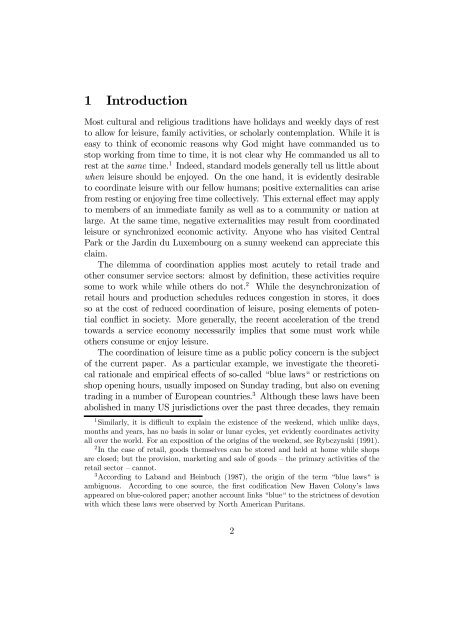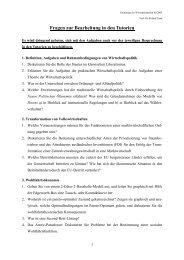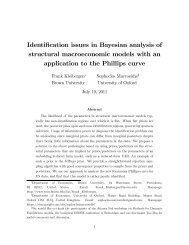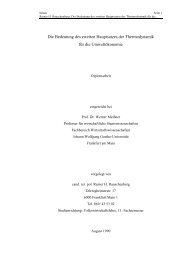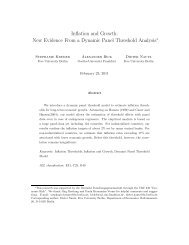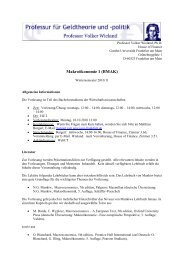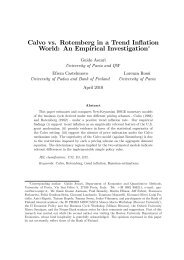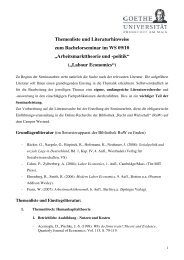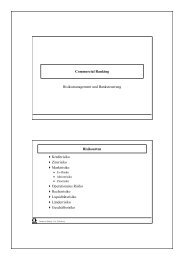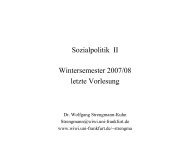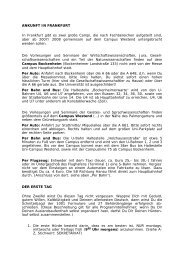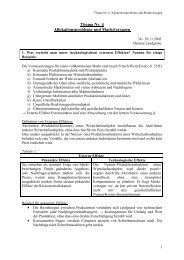Michael Burda - Sciences Po Spire
Michael Burda - Sciences Po Spire
Michael Burda - Sciences Po Spire
Create successful ePaper yourself
Turn your PDF publications into a flip-book with our unique Google optimized e-Paper software.
1 Introduction<br />
Most cultural and religious traditions have holidays and weekly days of rest<br />
to allow for leisure, family activities, or scholarly contemplation. While it is<br />
easy to think of economic reasons why God might have commanded us to<br />
stop working from time to time, it is not clear why He commanded us all to<br />
rest at the same time. 1 Indeed, standard models generally tell us little about<br />
when leisure should be enjoyed. On the one hand, it is evidently desirable<br />
to coordinate leisure with our fellow humans; positive externalities can arise<br />
from resting or enjoying free time collectively. This external effect may apply<br />
to members of an immediate family as well as to a community or nation at<br />
large. At the same time, negative externalities may result from coordinated<br />
leisure or synchronized economic activity. Anyone who has visited Central<br />
Park or the Jardin du Luxembourg on a sunny weekend can appreciate this<br />
claim.<br />
The dilemma of coordination applies most acutely to retail trade and<br />
other consumer service sectors: almost by definition, these activities require<br />
some to work while while others do not. 2 While the desynchronization of<br />
retail hours and production schedules reduces congestion in stores, it does<br />
so at the cost of reduced coordination of leisure, posing elements of potential<br />
conflict in society. More generally, the recent acceleration of the trend<br />
towards a service economy necessarily implies that some must work while<br />
others consume or enjoy leisure.<br />
The coordination of leisure time as a public policy concern is the subject<br />
of the current paper. As a particular example, we investigate the theoretical<br />
rationale and empirical effects of so-called “blue laws“ or restrictions on<br />
shop opening hours, usually imposed on Sunday trading, but also on evening<br />
trading in a number of European countries. 3 Although these laws have been<br />
abolished in many US jurisdictions over the past three decades, they remain<br />
1 Similarly, it is difficult to explain the existence of the weekend, which unlike days,<br />
months and years, has no basis in solar or lunar cycles, yet evidently coordinates activity<br />
all over the world. For an exposition of the origins of the weekend, see Rybczynski (1991).<br />
2 In the case of retail, goods themselves can be stored and held at home while shops<br />
are closed; but the provision, marketing and sale of goods — the primary activities of the<br />
retail sector — cannot.<br />
3 According to Laband and Heinbuch (1987), the origin of the term “blue laws“ is<br />
ambiguous. According to one source, the first codification New Haven Colony’s laws<br />
appeared on blue-colored paper; another account links “blue“ to the strictness of devotion<br />
with which these laws were observed by North American Puritans.<br />
2


